Replacing a water heater is a home maintenance task that many homeowners eventually face, and it’s essential to be well-informed about the cost involved. When your trusty water heater begins to show signs of wear and tear or simply reaches the end of its lifespan, you may find yourself wondering, “How much does it cost to replace a water heater?” The answer to this question can vary widely depending on several factors, including the type of water heater you choose, your location, and the complexity of the installation.
In this guide, we will explore the various considerations that influence the cost of replacing a water heater, helping you make informed decisions when the time comes to invest in a new one.
Average Water Heater Installation Expenses
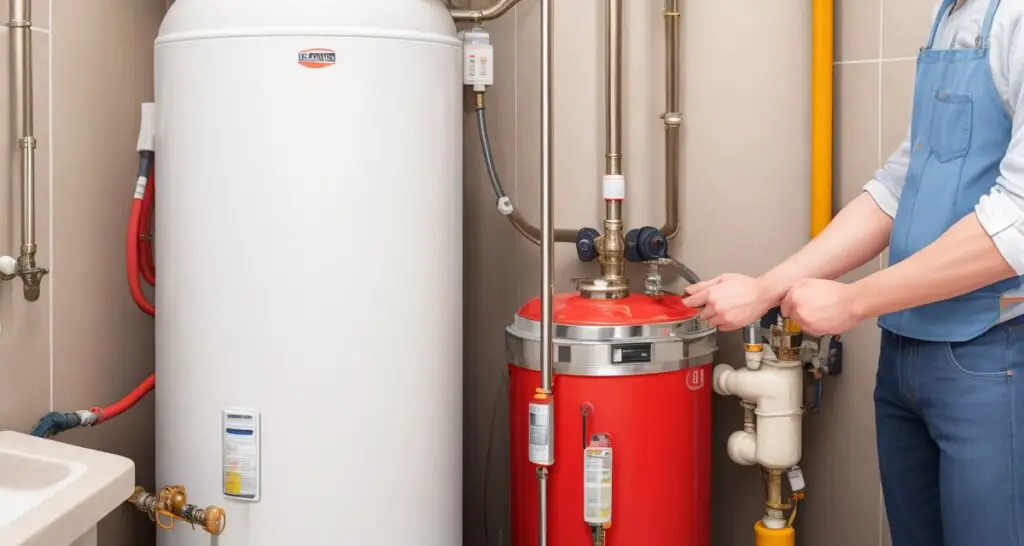
The selection of the water heater you desire significantly impacts your overall cost. For instance, a conventional tank water heater may start at approximately $820, whereas a tankless water heater typically commences at $1,200 and can go higher. The installation labor typically entails a cost range of $40 to $200 per hour, and the installation process usually spans from one to three hours. We’ll delve into more comprehensive information about the various factors affecting the costs below.
Water Heater Expenses Based on Size
Here is a detailed breakdown of the average water heater expenses according to the tank size:
30-gallon: $270–$1,000
40-gallon: $300–$1,600
50-gallon: $400–$2,500
75-gallon: $900–$3,200
80-gallon: $1,000–$3,200
Comparing Water Heater Installation Costs
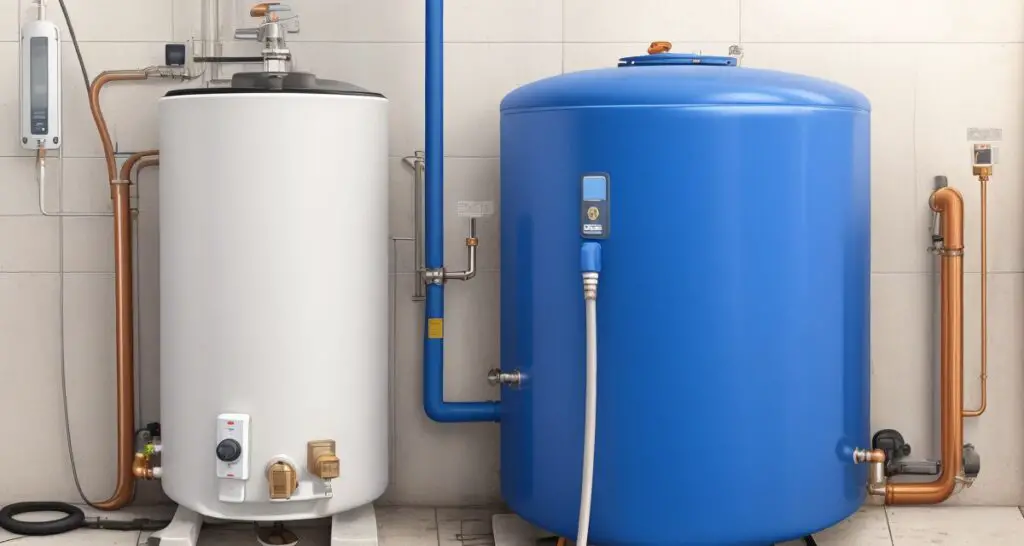
Water Heater Type | Average Installation Cost | Average Annual Cost | Lifespan | Efficiency Factor (EF)
Gas | $500 (plus venting) | $250 | 8–12 years | 0.58%–0.60%
Electric | $700 (plus venting) | $500 | 8–12 years | 0.92%–0.95%
Tank | $820–$1,290 | $250 | 8–12 years | 0.58%–0.60%
Tankless | $1,200–$3,500 | $175 | 15–20 years | 0.92%–0.95%
Hybrid Heat Pump | $1,200–$3,500 | $250 | 8–12 years | 2%
Indirect | $1,500 | $355 | 15–20 years | 0.59%–0.90%
Solar | $2,000–$3,000 | $175 | 20 years | 1.0%–1.1%
Tank vs. Tankless Water Heater Costs
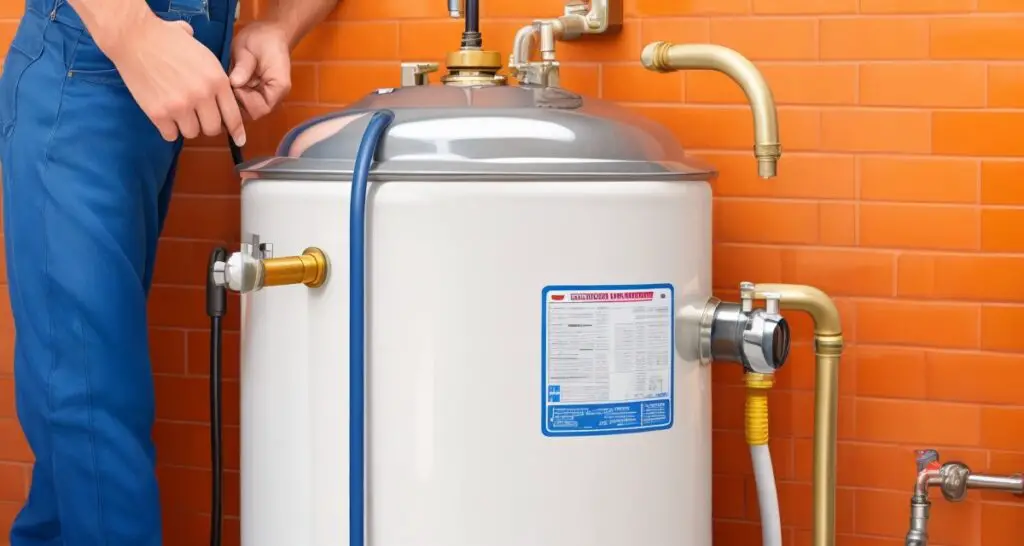
Tank and tankless water heaters are two of the most common types of water heaters available, each with its unique advantages and costs.
Traditional Tank Water Heater:
A traditional tank water heater is a cost-effective option for homeowners. The initial installation cost ranges from $820 to $1,290, depending on the tank’s size. While the upfront expense may seem relatively high, these units have a lifespan of 8-12 years, making them a durable investment. They are also energy-efficient, with an efficiency factor (EF) of 0.58%-0.60%. The lower EF means they may be less efficient in terms of energy usage.
Tankless Water Heater:
Tankless water heaters, on the other hand, have a higher initial cost, ranging from $1,200 to $3,500. However, they offer long-term savings and a lifespan of 15-20 years. Tankless heaters are highly energy-efficient, boasting an EF of 0.92%-0.95%. This increased efficiency is due to their on-demand heating system, which only heats water when needed, reducing standby heat loss. Tankless water heaters can lower your annual energy costs, which average around $175, making them a cost-effective choice over time.
Which One Is Right for You:
The choice between a tank and tankless water heater comes down to your budget and long-term goals. If you prefer lower upfront costs and can tolerate slightly higher annual energy bills, a tank water heater is suitable. However, if you’re looking for energy efficiency and long-term savings, the initial investment in a tankless water heater is a wise choice. In either case, it’s essential to evaluate your hot water needs and choose the option that best aligns with your lifestyle and budget.
Gas vs. Electric Water Heater Costs:
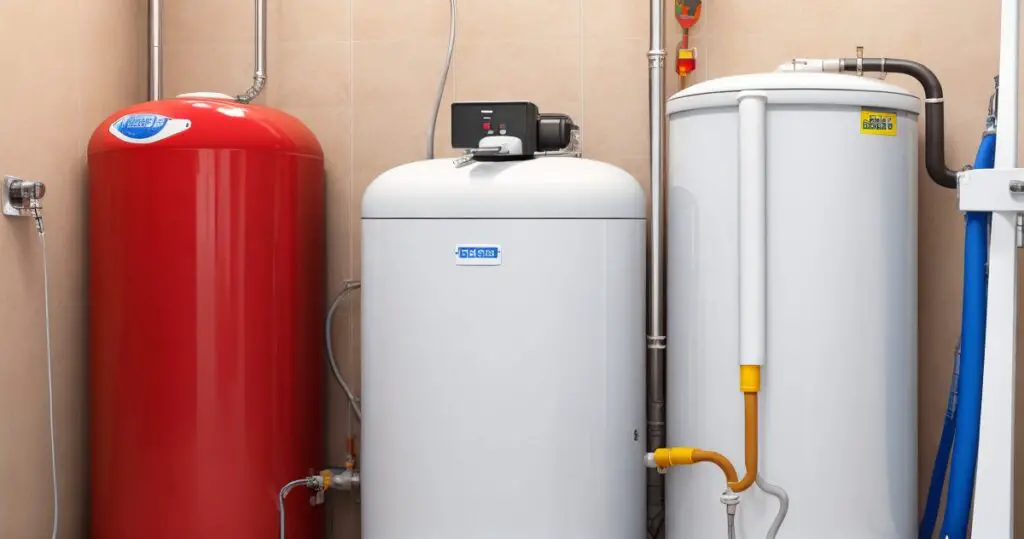
When deciding between gas and electric water heaters, you’ll be faced with choices that come with their own unique advantages and considerations. In this friendly guide, we’ll help you weigh the options.
Power Venting vs. Direct Venting:
You’ll have the choice between power venting and direct venting models, each with its own impact on installation costs. Power venting employs a fan to efficiently expel exhaust air from your residence. This feature adds an approximate $300 to $600 to the initial water heater cost, along with an extra $300 to $500 for essential wiring and electrical work. On the other hand, direct venting, which draws combustion air from the outdoors and directly expels it outside your home, adds around $500 to $1,000 to your total expenses.
Electric Water Heaters:
Opting for an electric water heater is often a budget-friendly choice. The cost of purchase and installation for a 50-gallon tank is roughly $500. However, it’s important to note that monthly operational costs are typically higher when compared to gas counterparts. On the bright side, electric water heaters are deemed safer since they carry a lower risk of gas leaks or combustion-related concerns.
One limitation of electric water heaters is their reliance on a continuous power supply. In the unfortunate event of a power outage, your hot water supply would be affected. These water heaters typically possess an Energy Factor (EF) rating ranging from 0.90% to 0.95%, offering a typical lifespan of 8 to 12 years.
Gas Water Heaters:
In contrast, gas water heaters may have a higher upfront cost, typically around $700 for a 50-gallon tank. Yet, the ongoing operational costs are notably lower than those of electric models. Despite concerns about natural gas combustion or leakage, gas heaters can provide a continuous supply of hot water without electricity.
However, it’s essential to be aware that gas water heaters produce carbon dioxide emissions that can have environmental implications. Their Energy Factor (EF) ratings are somewhat lower, usually resulting in 60% to 70% energy efficiency and a lifespan of 8 to 12 years. Making an informed choice between these two options should take into consideration your specific needs and circumstances.
Energy-Efficient Storage Tank Water Heater Costs
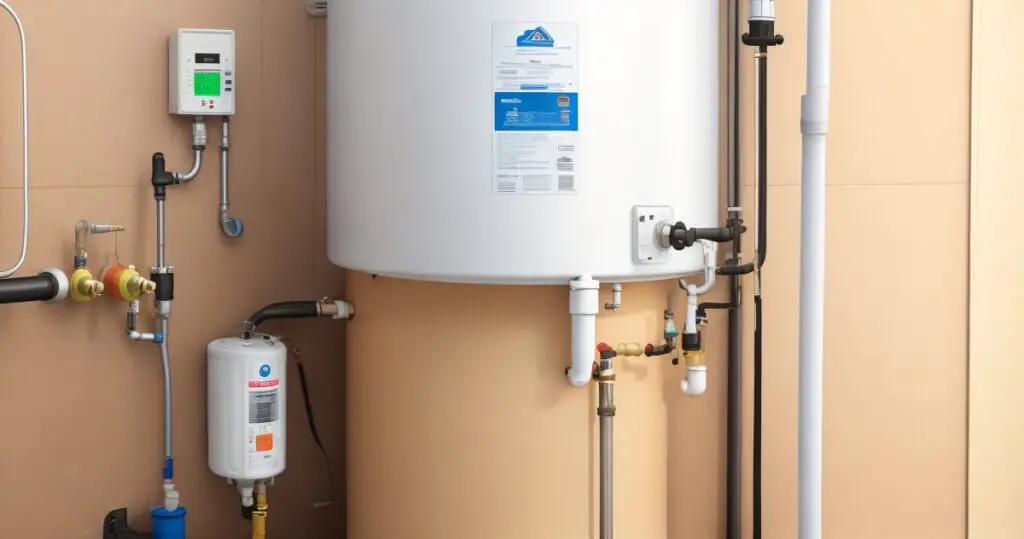
Solar Water Tank Heaters:
Solar water heaters offer a green and sustainable approach to heating your water supply. These systems harness the power of natural sunlight, consisting of a storage tank to contain water and solar collectors designed to generate heat. It’s worth noting that in case of cloudy days or lower sunlight, solar water heaters are equipped with a traditional water tank as a reliable backup.
Solar water tank systems come in two distinct varieties: active systems and passive systems. Active systems employ a pump to efficiently distribute water throughout your home, ensuring a steady and warm supply. In contrast, passive systems rely on natural convection for water circulation, adding an element of simplicity and affordability. For an investment in sustainable living, homeowners can anticipate costs of around $2,000 for a passive system and $3,000 for an active system. This investment’s slightly higher price tag is attributed to the meticulous installation and the inclusion of a backup water heater, providing peace of mind.
Indirect Water Heaters:
Indirect water heaters are a smart and energy-efficient choice that takes advantage of the energy generated by an existing furnace or boiler to warm the water in the tank. This innovative method involves circulating water from the boiler through the tank’s coils, efficiently and consistently heating the water within. Although they come with a somewhat higher upfront cost of approximately $1,500, the monthly operational expenses are significantly more economical than those associated with traditional water heaters.
Hybrid Heat Pump Water Heaters:
For those seeking a remarkable balance of efficiency and sustainability, hybrid heat pump water heaters are an attractive option. These units ingeniously draw heat from the surrounding air and, using a combination of compressors and coils, convert it into a reliable source of hot water. However, it’s essential to consider that hybrid heat pump water heaters are relatively large and require a spacious setting, with approximately 7 feet of clearance. The investment in these state-of-the-art units ranges from $1,200 to $3,500, encompassing installation and materials, offering both exceptional efficiency and a contribution to a greener tomorrow.
Additional Considerations for Water Heater Installation Costs:
As you explore water heater installation, it’s essential to be aware of several supplementary factors that can influence the overall expense. These aspects, though not directly tied to the heater itself, can significantly impact the cost of the project. Here’s a breakdown of these considerations:
Location in the Home:
The placement of your water heater within your home plays a pivotal role in determining the labor cost. If the installation site is challenging to access, such as tucked away in a basement or an attic corner, expect an increase in installation expenses.
Size:
The size of your water heater is contingent on the number of occupants in your household. Larger units come with higher price tags. A 40-gallon water heater, suitable for a two-person home, typically ranges from $320 to $1,600. Homes with five or more occupants may necessitate a 75-gallon unit ($900–$3,000) or an 80-gallon unit ($1,000–$3,200).
Relocation or Fuel Type Conversion:
Should you decide to move your water heater, the associated costs can vary significantly. Relocating a unit may cost anywhere from $200 to $10,000. Similarly, altering the fuel type of your water heater can introduce Expenses. For instance, transitioning from electric to gas requires the installation of new gas lines, typically adding an extra $1,500 to $2,300 to the overall installation cost.
Venting System:
The type of venting system you opt for can also affect the total expenditure. Power venting, as mentioned earlier, can contribute $600 to $1,100 to your installation, while direct venting may result in an increase of anywhere from $500 to $1,000.
Tank Removal:
In cases where you’re replacing an existing water tank, your installer may charge extra for the removal of the old unit.
Materials:
The installation process entails various materials, including venting pipes, pressure valves, water and gas piping, thread compound, solder, and more. A more complex installation may require a greater quantity of these materials.
Expansion Tank:
A professional installer might recommend adding an expansion tank, designed to manage the thermal expansion of water and prevent excessive water pressure. These expansion tanks typically cost between $40 and $150.
Local Permits:
Depending on your home’s location, local permits may be obligatory for water heater installation. The acquisition of these permits may come with a Cost.
Carpentry Work:
In certain scenarios, such as the need to modify your attic’s structure to accommodate a heater, carpentry work may be necessary. This can lead to increased labor costs and hours worked.
Understanding these supplementary factors is crucial for a comprehensive assessment of the potential costs associated with your water heater installation project.
Indicators of a Water Heater in Need of Replacement
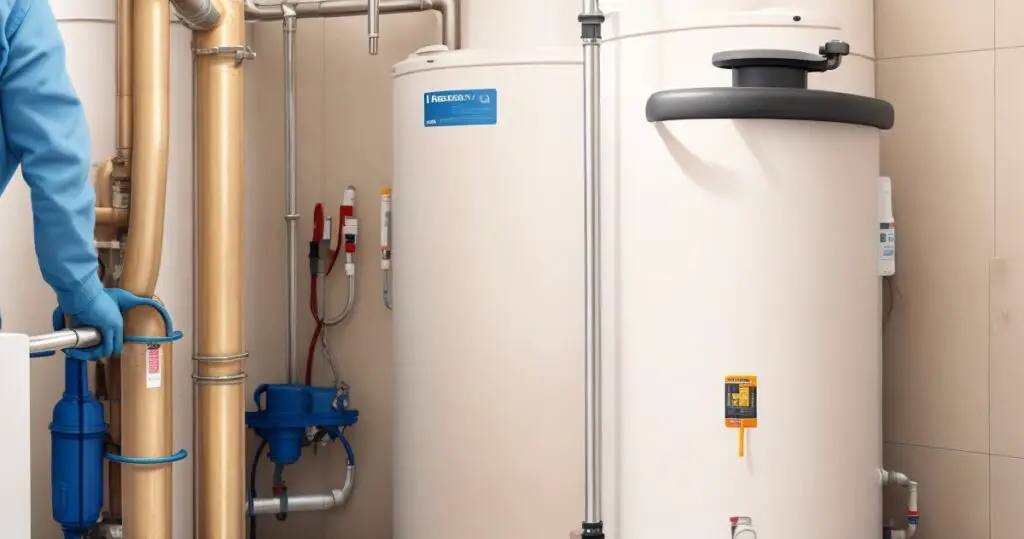
If you are a current owner of a water heater, it’s prudent to keep an eye out for the following telltale signs that could signify the need for a replacement. Taking note of these indications and maintaining your system with quality products, like those available from reputable companies such as Corro-Protec, can help prevent potential issues. Here are the signs to watch for:
Age Beyond 15 Years:
A water heater that has gracefully served you for more than 15 years may be approaching the end of its functional lifespan, making it a suitable candidate for replacement.
Discolored or Unusual Water:
The presence of discolored or oddly tasting water from your faucets can be a concerning sign, possibly indicating internal corrosion within the water heater.
3. Unusual Sounds:
The occurrence of loud or unusual noises emanating from your water heater is a sign that internal components might be deteriorating or malfunctioning.
Leaks:
The discovery of water leaks in or around your water heater is a clear indication of system failure and the need for immediate attention.
Slow or Inadequate Heating:
Water that takes longer than usual to heat up or fails to reach the desired temperature may suggest that the heating elements or thermostat in your water heater are no longer functioning optimally.
Recognizing these signs in a timely manner allows for proactive measures to address potential water heater issues. Whether you consider a replacement or professional maintenance, it is crucial to ensure the continued efficiency and safety of your water heating system.
Valuable Insights for Choosing Your Water Heater
When you embark on the journey of selecting a water heater for your home, there are pivotal aspects to ponder to ensure you make a wise choice. Here are some fundamental points to keep in your thoughts:
Fuel Type and Accessibility:
Prior to committing to a water heater, it’s imperative to identify the required fuel type and its availability in your local area. For instance, if you are contemplating a natural gas water heater, ensure that your property is equipped with or can easily accommodate a natural gas supply line.
Household Size:
Determine the appropriate water tank size based on the number of occupants in your home. As a general guideline, a two-person household typically benefits from a 30–40 gallon tank, while a four-person family may require a 50–60 gallon tank to meet their hot water needs adequately.
Cost and Energy Efficiency:
Deliberate over both the initial cost of the water heater and its energy source. While certain units may come with a higher upfront price, their enhanced energy efficiency can pave the way for long-term cost savings. Striking the right balance between the initial investment and potential energy savings is essential for making a financially prudent choice for your home.
By taking these factors into careful consideration, you can confidently reach an informed decision when it comes to selecting a water heater that seamlessly aligns with the specific requirements of your home and your long-term budget.
Understanding Labor Costs in Water Heater Replacement
When it comes to the replacement of your water heater, it’s crucial to comprehend the factors and costs associated with the labor aspect. Whether you hire a professional plumbing company or a dedicated water heater specialist, they will typically provide you with a comprehensive, flat-rate quotation. This quote often encompasses several key components that ensure a hassle-free installation process.
First and foremost, the price typically includes the actual water heater unit itself. It covers the delivery of the new water heater to your doorstep. The heart of the service lies in the installation process, which is meticulously carried out by a local licensed and insured plumber. It encompasses the removal and responsible disposal of the old water heater, ensuring eco-friendly practices are adhered to. In most cases, the labor costs also cover any necessary permits required for this project, saving you the trouble of navigating bureaucratic hurdles.
If you’re contemplating a do-it-yourself approach, there’s still room for professional assistance. In such instances, you might find yourself needing the services of experienced plumbers or electricians. They usually charge for their time on an hourly basis, providing you with the flexibility to choose the level of professional involvement that suits your project’s specific requirements.
Conclusion
The cost of replacing a water heater can vary widely based on factors such as the type of water heater, labor costs, location, and Modifications required. On average, you can expect to pay anywhere from $800 to $2,500, which covers the price of the water heater itself and installation by a licensed professional. Remember that investing in energy-efficient models may have a higher upfront cost but can lead to long-term savings on your utility bills.
To get an accurate estimate for your specific situation, it’s advisable to consult with local professionals and consider factors like your home’s needs, your location, and the available energy sources. Regular maintenance and proper care can also help extend the lifespan of your water heater, reducing the frequency of replacements and saving you money in the long run.
FAQS On How Much Does It Cost To Replace A Water Heater?
What’s the typical cost of replacing a water heater?
The cost of replacing a water heater can vary depending on multiple factors, but generally, it ranges from $800 to $2,500, which includes the price of the water heater and installation. However, specific costs can be influenced by factors such as the type of water heater (tank or tankless), labor costs, your location, and any Modifications required.
Are tankless water heaters more expensive to replace than tank-style heaters?
Yes, typically, tankless water heaters are more expensive to replace than tank-style heaters. A tankless water heater can cost between $1,200 and $3,500, while tank-style heaters range from $820 to $1,290. The installation of tankless heaters is more labor-intensive, contributing to the higher cost.
What are the labor costs associated with water heater replacement?
Labor costs for water heater replacement usually include the water heater unit itself, delivery, installation by a licensed plumber, removal of the old heater, and necessary permits. This can cost between $500 to $1,500, depending on the complexity of the project.
Do location and regional differences affect water heater replacement costs?
Yes, location and regional differences can significantly affect water heater replacement costs. Prices can vary based on labor costs, permit fees, and the availability of specific water heater models. For instance, replacement costs in a high-cost-of-living city may be higher than in a rural area.
Can I replace a water heater by myself to save on costs?
While it’s possible to replace a water heater by yourself, it’s recommended to hire a professional for safety and compliance. DIY replacement might save on labor costs, but it can be complex and risky, potentially voiding warranties or causing safety issues if not done correctly.

